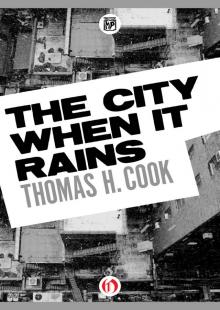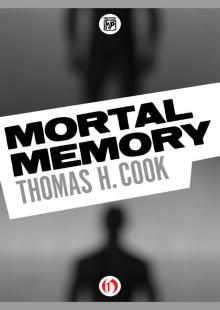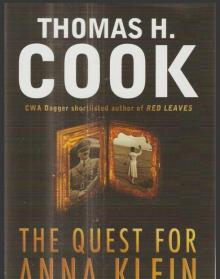- Home
- Thomas H. Cook
Mortal Memory Page 19
Mortal Memory Read online
Page 19
“Everything okay?” I asked.
“I suppose so,” Marie answered in a strange, uncertain reply.
“All your projects moving along?”
It clearly struck her as a spiritless question, with an answer neither wanted nor expected, but she did not make an issue of it. Instead, her mind appeared to shift to a more casual concern. “I thought we might call out for a pizza for dinner,” she said.
I nodded. “Fine with me.”
The thoughtful look returned, studious, concentrated, as if she were trying to read something written on my forehead. “You’ve been getting home at such odd hours for the past few weeks, it’s hard to know exactly when to cook,” she said.
I nodded. “We’re finishing up a few big drafting jobs at the office,” I told her, though she had not asked for any further explanation of my unusual absences.
“Finishing up?” she asked. “So things should be back to normal soon?”
“Yeah, pretty soon.”
She smiled, though a little stiffly. “That’s good,” she said.
“Anything else?” I asked.
The question seemed to strike her as more serious than I had meant it. She looked at me solemnly. “Should there be?”
I shook my head. “Not that I know of.”
“Okay,” Marie said, but with an unmistakable tone of resignation, as if a chance had been offered, but not taken. Then she reached for the phone, though her eyes never left me. “With anchovies?” she asked, in a voice that sounded unexpectedly sad.
“Yeah, that’s fine,” I told her, drawing away from the door. “I just need to go wash up.”
I walked up the stairs to our bathroom and washed my hands. As I did so, the phrase Marie had used, “back to normal,” lingered uncomfortably in my mind. For Marie, it meant the return to a precious predictability and routine. To me, however, it meant the end of something exciting and full of unexpected discovery. As I dried my hands that evening, I felt like a man who’d lived for many years on a deserted island, only to spot, for a single, shining hour, the approach of a long white ship, the dream of rescue growing wildly with each passing moment, until, after an excruciating interval of anticipation, the great ship had drifted once again toward the far horizon, and, at last, disappeared beneath the flat gray of the sea.
“Steve?”
It was Marie calling from downstairs, but I couldn’t answer. I stood, as if transfixed by the misty glass of the bathroom mirror.
“Steve, the pizza’s here.”
The pizza had arrived, and moving as if on automatic pilot, I went downstairs, paid the delivery boy, and brought the large square box into the kitchen.
Peter and Marie gathered around, and I methodically gave each of them a slice, then got one of my own, eating it silently with them at the kitchen table.
Across from me, I could see Peter’s blond head lowered over his plate, but I didn’t think of him, or of Marie. Instead, I returned to my father.
I saw him in his long silences, in the lair he’d made for himself in the gray basement. I saw him as he watched each of us go through our daily, unexalted lives, and I wondered at the process by which we had been reduced to nothing in his eyes. Nothing, at least, beyond profound intrusions. Had he spent night after night in the house on McDonald Drive, listening mutely to our squabbling, and thought only of how he might be released from us, set free, at last, to go to … what?
Was it to his own, still undiscovered version of Rebecca?
Was it the pain of not being with her that he had, at last, found impossible to bear?
It was hard to imagine, and yet I had no choice. I wondered if during the long, drab dinners at our kitchen table, my father had dreamed of a “someone else” while he’d listened absently to our quarreling or our dull school day gossip. Had he dreamed of spiriting her away to his own dream house, a cottage in the hills, perhaps? And each time, had that rapturous vision foundered on the banks of our daily bickering and mundane pettiness?
I remembered that as a child, I’d noticed moments when my father had stared vacantly out the window or sat in isolation in the little, vine-draped solarium. Perhaps, on those occasions, he’d let himself be carried away by the intensity of his need.
I also saw him in his van, staring at my mother as she crouched over her flower bed, and I marveled at how easily I could put Marie in the place of “poor Dottie,” how easily I could shrink her down to a small, dry pebble.
Later that same night, as I walked out into the backyard, my feet trudging through the dry, steadily accumulating leaves, I thought again of how lost my father had looked as he’d sat alone in the brown van. I saw his face, deep-lined and webbed in misery, but with a terrible edge of purpose within it, his eyes shining through the smoke, cold and without pupils, mere round, ice-blue orbs.
After a time, I returned to the house. I watched television with Peter, then chatted with Marie for a few minutes after he had gone to bed, a dull conversation which appeared to annoy her after a while, so that she finally marched up the stairs and went to bed.
I went to my office, sat down at my desk, and began to add a few passionate but unreal lines to my “dream house.” The house had become even more vague and insubstantial during the last few weeks, with turrets and towers and unsupported balconies, a house that could exist only in a world that had forsaken gravity, along with all the other laws that govern earthbound things.
It was the phone that finally interrupted me. I picked it up, and to my immense surprise, it was Rebecca.
There was something urgent in her voice, and for a moment I allowed myself the fantasy that she had been seized by the same deep yearning for me that I had so long felt for her.
“It’s me,” she said.
“Yes, I know.”
“I won’t be able to meet with you on Wednesday afternoon. I have to check on a few things.”
I could clearly hear her reluctance to say more. I could also hear the sound of engines in the background, the rustle of passing voices.
“You’re at the railway station,” I said.
“No, the bus station,” she said. “I’m going to Somerset. To see Swenson.”
“When will you be back?”
“By Saturday.”
“So we can meet at the usual time that day?”
“Maybe a little later, if that’s all right,” she said. “I’ll let you know.” I heard a pneumatic door as it opened. The strain returned to Rebecca’s voice. “I’ve got to go,” she said. “My bus is leaving.”
Then she hung up.
The phone was still in my hand when Marie came to the door. She was dressed in a sleek, white sleeping gown, her hair in disarray.
“Who was that?” she asked drowsily.
I said the first name that occurred to me. “Wally,” I told her.
She seemed to awaken suddenly, the veil of sleep dissolved. She looked at me, puzzled. “So late?” She glanced at the clock which hung on the wall to her left. “It’s past midnight.”
I shrugged. “He just wanted to talk about a problem we’d run into earlier today.”
She smiled, but distantly. “I didn’t think Wally ever cared that much about anything at work.”
She knew him well, and she was right. Wally had never been the type to give his work a second thought once he’d left the office. He’d been a bad choice, but I was stuck with him.
“He’s been a little more concerned with things lately,” I said. “Maybe he’s a little worried, too.”
“About what?”
“I don’t know,” I said with a shrug. “Mr. Lowe’s opinion of him, I guess.”
Marie smiled at the mention of Mr. Lowe’s name, a quiet, respectful smile.
“Anyway, we straightened it all out,” I added quickly.
“Good,” Marie said. She looked at me softly. “So, are you coming to bed soon?”
“It won’t be long,” I assured her.
She nodded and drew herself back out into
the corridor. “Good night, then,” she said as she disappeared into its darkness.
I sat back in my chair and let my eyes settle on the telephone. Marie had already vanished from my mind, but merely by staring at the phone I could all but feel Rebecca’s breath still surging toward me through its stiff black lines.
I got up early the next morning. While still in bed, I reached up and touched my face. I could feel the scratchy texture of my morning beard, and it reminded me of the dream I’d had a few weeks before, a dream of waking up in a place I didn’t recognize, a small room with an old sink and a battered armoire. I remembered the short white curtains and the warm, tropical breeze that had lifted them languidly, revealing a rust-colored landscape of tiled roofs and dark spires.
A few minutes later, I walked downstairs. Everything in my house, I realized, looked old and encrusted, and had lost its power of attraction. It was a feeling which Rebecca had already begun to explore. “For these men, perhaps, for all men,” as she finally wrote, “the sense of permanence in human relations rarely issues a truly romantic call, rarely speaks in thrilling whispers or attains the electrifying jolt of a lover’s voice.” The capacity to imbue long and enduring relations with just that kind of highly charged romanticism, she added, “was the single greatest achievement of the female imagination.”
Whether true or not of all men, Rebecca’s insight was true enough of me. For it was undoubtedly the “thrilling whisper” rather than the “sense of permanence” that I wanted as I stood among all the things and people who’d gathered around my life.
“You tossed a lot in bed last night,” Marie said as she came down the stairs.
I gave her a weak smile. “I’ve got a lot on my mind,” I told her. I didn’t add anything else, but merely allowed her to assume that my recent agitation was related only to my work, that there was nothing growing in me that she should fear.
Peter came bounding down the stairs a few minutes later. He wolfed down the cereal Marie had poured into the bowl, then headed out to the driveway for a couple of hoop shots before he left for school. I could see him playing happily in the sun as he leaped about the cement driveway, ducking and swooping, pretending that the opposite team was closing in upon him.
“You know, he’s a pretty good basketball player,” I said as Marie rose and headed for the stairs.
She turned toward me and smiled weakly. “Like his dad was,” she said, almost wistfully, as if remembering the former life of a loved one who had already died.
She was still upstairs when I left the house a few minutes later. I passed Peter on the way to my car, stopped to make a couple of shots, then drove away. In the rearview mirror I could see his hair shining in the early morning sun.
I arrived at my office a few minutes later. I had barely gotten to my desk when Wally stepped up to it.
He smiled brightly and slapped me on the shoulders. “You got lucky, old chap,” he said.
“What do you mean?”
“I have to go into New York today, and Mr. Lowe told me to take you along.”
“To do what?”
“I’m delivering the latest drawings on the Global Apartments project,” Wally told me. “Old Man Lowe thinks you should be there in case there are any questions.”
Normally I would have dreaded such a trip. My love was drawing in my private cubicle, the seclusion of creating isolated forms. I hated meetings of all kinds, especially client meetings. But that day such a ride into the city struck me as a respite, a way of regaining the strength which had been drained from me during the night.
We took the old U.S. 1 rather than the highway, moving through shady Connecticut villages until we reached the crowded suburbs of New York. Wally drove in his usual style, casually, with his arm slung out the open window. He was about twenty pounds overweight, and his reddish hair had thinned considerably since the days he and Marty Harmon and I had first worked together at Simpson and Lowe, but there was still a raw and vulgar boyishness about him, a quality that appeared to attract some people as much as it repelled others. The young secretaries often flirted with him openly, while the older ones, married or looking toward marriage, thought him a pathetic clown.
That day, as we drove through the bright, still summery, air, Wally lit one cigarette after another, often bobbing the lighted tips wildly as he spoke. He related tales of his various jobs, his youth, finally his travels, either alone on business trips, or with his wife and family.
“You don’t get out much, do you, Steve?” he asked at one point. “Out of Old Salsbury, I mean.”
“Not much.”
“When was the last time you were in New York?”
“Years ago. I can hardly remember.”
Wally shrugged, letting the subject drop.
I thought of the night before, the excuse I’d made to Marie about Rebecca’s call.
“Listen, Wally,” I said as we headed through the last stretch of road that led into the city, “if Marie ever mentions anything about my getting a call from you late last night, I …”
Wally’s eyes shot over to me. “You need an alibi, Steve? Someone to cover for you?”
“Well, it’s just that last night …”
“She called, right?” Wally said with a slow smile. “She always does, in the end.”
“Who does?”
“The other woman,” Wally said flatly. “She always says she’ll never call you at home, but she always does.”
“This was a little different,” I said quickly.
Wally looked at me pointedly. “It couldn’t have been too different,” he said, “or you wouldn’t have had to lie about it, would you, old buddy?”
He was right, of course. But only partly right. For though Rebecca was not my lover in any technical sense, she had come to represent one: the flight from life’s heaviness, the possibility of escape.
“So is it love?” Wally asked lightly.
I didn’t answer.
Wally’s smile broadened. He didn’t press the question, but settled instead for a different one. “It’s the woman who came to see you in the office that day, am I right?”
I nodded faintly, reluctantly.
“Whew!” Wally said, pretending to wipe a line of sweat from his forehead. “Hot, hot, hot.”
I watched the road, adding nothing, feeling neither shame nor the absence of shame, but only the disquieting sense that I had cheapened the nature of my own feeling for Rebecca by being unable to explain it.
“Does she live in Old Salsbury?” Wally asked.
“A little ways outside it.”
“Do you see her a lot?”
“Not too often.”
Wally shrugged. “Well, just tell her to ease up on the old home phone, you know?” he said. Then he grinned impishly, one worldly man to another. “Either that, or keep me well-informed in case …” He stopped. “What’s your wife’s name?”
“Marie,” I said.
Wally nodded briskly, then finished his sentence. “In case Marie calls me up sometime to find out where the hell you are.”
“She’d never do that,” I assured him. “She’d never try to track me down.”
“Don’t kid yourself, buddy,” Wally said. “If she starts really chewing at it, she’ll track you down all right.”
I shook my head. “No, she wouldn’t,” I told him. “She’d rather die first.”
Suddenly I felt my eyes grow cool and vacant, and there must have been something in my voice, because I felt the car veer to the right, then come to a noisy halt along the bank of the road. I turned toward Wally. He was staring at me worriedly.
“Whoa, now, buddy,” he said.
I glanced at him quickly, defensively, as if some part of a secret plot had been uncovered.
“You look a little weird, Steve,” Wally added. He reached over and squeezed my shoulder. “You don’t want to let things get out of hand, you know?”
“What do you mean?”
“With this woman,” Wa
lly said, “the one’s who’s fucking your mind.” He looked at me pointedly, giving me his best advice. “You don’t want to burn the house down, you know?”
“Burn the house down?”
He smiled indulgently. “The first time a woman comes flying into things, it really jerks your tail into a knot, I know,” he said. “But then, when that one’s gone, another one comes along, and after two or three times like that, you realize that it’s all just fun and games, that there’s no need to get all knotted up about it.”
I shook my head. “It’s not like that with me,” I told him. “It’s not just fun and games.”
He laughed at my boyish innocence. “So, I guess you’re one of these men that has to take it seriously, right?” he asked.
I didn’t answer. I had no answer.
Wally watched me soberly. “Listen, Steve, you can play around with this woman, have your fun and all that, but when it’s all over, you need to go home and warm your feet at the same old fire.” He waited for me to answer. “I’m talking about your wife, Steve.”
“Marie,” I said, but my voice was little above a whisper.
Wally gave me a penetrating look. “You have to be careful and not get things mixed up, that’s what I’m saying.” He paused a moment, his eyes watching me closely. “When they get mixed up, bad things can happen,” he added darkly. “Remember Marty Harmon?”
I nodded silently.
“He was one of these men that couldn’t keep things straight,” Wally told me firmly, “and look what happened to him.”
Suicide, of course, had “happened” to Marty, but it had never occurred to me that I was in the least like him, or that I might ever reach such a state of physical and spiritual exhaustion. It wasn’t death I wanted, it was a different life.
The realization that swept over me at that instant was as close as I had ever come to a full understanding of how far I had been swept out to sea, of how deep my discontent actually was.
“I can’t go back,” I muttered weakly.
“To wherever you were before this woman, you mean?” Wally asked. “Of course you can.”
I shook my head slowly.

 The Interrogation
The Interrogation Sacrificial Ground
Sacrificial Ground The Fate of Katherine Carr
The Fate of Katherine Carr What's In A Name
What's In A Name Blood Innocents
Blood Innocents Peril
Peril A Dancer In the Dust
A Dancer In the Dust Breakheart Hill
Breakheart Hill The Chatham School Affair
The Chatham School Affair The City When It Rains
The City When It Rains Blood Echoes
Blood Echoes Mortal Memory
Mortal Memory Evidence of Blood
Evidence of Blood Into the Web
Into the Web The Crime of Julian Wells
The Crime of Julian Wells Blood Echoes: The Infamous Alday Mass Murder and Its Aftermath
Blood Echoes: The Infamous Alday Mass Murder and Its Aftermath Night Secrets
Night Secrets Places in the Dark
Places in the Dark The Orchids
The Orchids Elena
Elena Streets of Fire
Streets of Fire Instruments of Night
Instruments of Night Sacrificial Ground fc-1
Sacrificial Ground fc-1 The Quest for Anna Klein
The Quest for Anna Klein Sandrine's Case
Sandrine's Case Quest for Anna Klein, The
Quest for Anna Klein, The Fatherhood
Fatherhood Flesh and Blood
Flesh and Blood Red Leaves
Red Leaves